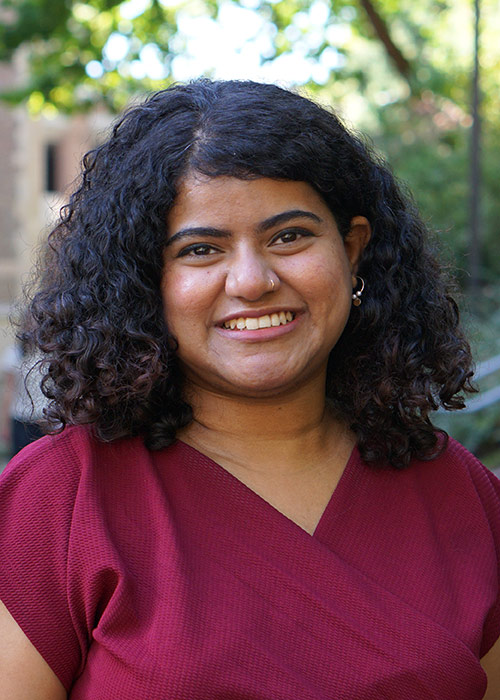
Why did you choose UW?
For me, UW checked every box. The program was one of the few that blended nutrition science with a big picture approach to food, health, and equity. I was especially excited about the RDN training through the Graduate Coordinated Program in Dietetics (GCPD) because of the program’s connections to Seattle hospitals and community centers. Learning hands-on, not just in a classroom, appealed to me. And Seattle is a beautiful and innovative city, and full of people who care deeply about food and public health.
What influenced you to pursue a graduate degree in food systems, nutrition, and health?
My passion has always been rooted in equity and making sure communities have what they need to thrive. That’s what pushed me to pursue a bachelor’s in nutrition. When I began working in hospitals and gyms, I realized how often nutrition conversations stop at the individual level. I wondered about the bigger picture. How does access to food, social inequality, and even agricultural policies shape who gets healthy food? These questions, and the tension between the clinical world and working to improve the system, are what inspired me to pursue this degree.
How do you see the important role of nutrition in public health and disease prevention?
To me, nutrition is the bridge between individual choices and population health. It is not enough to say, “just eat more vegetables.” Designing environments where healthy choices are possible and affordable for everyone is more important. A public health focus lets us move beyond treating individuals to preventing disease at the community level. I think this is true especially with children. Children are vulnerable but also incredibly responsive to early interventions. Prevention through nutrition is not just smart, it is compassionate and cost effective.
What’s something you have learned while at UW that has changed your perspective?
In one of my very first classes, my cohort discussed Thinking in Systems by Donella Meadows which showed me that big problems never get solved by one person alone. Real change in food systems requires collaboration across many players. That was a lightbulb moment for me. I also fell in love with the “small wins” framework, which taught me to see progress as something gradual but powerful. Now, I look at the future with more hope and patience.
Tell us about your current fieldwork or practicum, or a recent collaboration or accomplishment.
I have been lucky to explore different spaces. One of my most memorable experiences was at Camp Leo for Children with Diabetes which was one of my GCPD rotations. Camp Leo is a summer camp for kids with type 1 diabetes, where I learned so much from both the campers and the medical staff. I also work with Judy Simon, a registered dietitian at UW Medicine, on creating a dietary guide for South Asian women with PCOS, a condition which is becoming more and more common. In between these activities, I volunteer at the UW Food Pantry, making sure Huskies do not go home hungry. Each experience has given me something new and meaningful.
What motivates you and what are your future goals?
Someday, I want to see a food system where no one has to worry about where their next meal comes from. That feels big, but it keeps me motivated. In the near term, I want to deepen my knowledge in nutrition, work closely with both hospitals and community organizations, and eventually step into policy and decision making. I feel especially called to ensure mothers and children always have reliable resources, no matter their situation.
What do you like to do for fun?
Food is a theme in my life, even for fun. I love experimenting with new recipes. But I also love long walks, reading, and exploring new corners of the city. Backpacking and staying in new places just to try unique foods is one of my favorite ways to travel.
What do you enjoy most about living in Seattle?
I enjoy nature in the Pacific Northwest the most, hands down. I used to struggle to choose between beaches or mountains, but in Seattle, I do not have to. I can have both. Add to that, many people I’ve met here are passionate about making the world better. Along with this, the climate reminds me of my home Bengaluru.
What advice would you give someone considering your programs?
Be ready to explore. This program is not just about nutrition facts it is about systems, policy, and equity along with the whole mix. Dive into conversations with your professors and classmates early, they are incredible resources. Bring your own passions into your projects because that is where the magic happens. And do not be afraid to stretch outside your comfort zone, that is where the real growth is waiting.
Are you interested in studying nutritional sciences as a graduate student? Explore programs and RDN training offered in the UW Food Systems, Nutrition, and Health program.